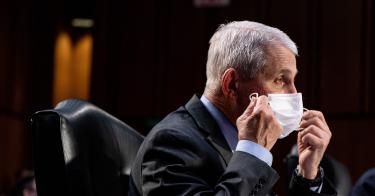When it comes to countering COVID-19, the public is often told to "follow the science." Excellent advice.
But are public officials actually doing just that? The conflicting messages make you wonder. Take the recent exchange between Sen. Rand Paul and Dr. Anthony Fauci, the nation’s premier public health expert. Fauci, who is vaccinated, showed up at a Senate hearing wearing two masks. He then recommended that people continue to wear masks after their vaccination. Paul, who is a medical doctor, asked if Fauci could cite any scientific study to support that recommendation. He provided none.
>>> How Public Health Officials Can Convince Those Reluctant To Get the COVID-19 Vaccine
Not long after that, Centers for Disease Control and Prevention Director Rochelle Walensky stated that vaccinated people do not spread the virus. Walensky added that in real-world scenarios, the vaccines were highly effective at preventing illness and the spread of the virus and that vaccinated people can’t carry the virus. Yet after that interview, the CDC establishment reeled in Walensky’s comments to align with Fauci’s opinion. Masks, they said, should continue to be worn by vaccinated people until further data is available.
As a matter of public health and public trust, this is a big problem. It is also not the first time that federal officials, including officials at the CDC, have given the public conflicting, confusing, or incorrect information.
The good news is that elected officials have begun demanding scientific evidence from public health experts. They want to find the right balance between protecting public health and providing for personal and economic liberty. Notably, the courts have ruled that extended emergency orders and certain public health regulations are tantamount to government overreach. Public skepticism of doomsday predictions about the trajectory of the virus is increasingly justified.
But if Fauci cannot provide scientific evidence that the public should continue to wear masks after vaccination, then who can? Might the answer be hidden deep in the vaults of the CDC? If there is evidence, the CDC should present it and eradicate all doubts.
The truth is actually quite clear. There are data supporting the position that vaccinated people may not need to wear masks. Two studies conducted in Israel have shown the Pfizer vaccine to be effective in reducing the spread of the virus by anywhere from 75%-90%. The study referred to by Walensky suggests a similar conclusion. While the studies are limited, the data are promising. There's another positive to consider: Current vaccines show at least some effectiveness against the most concerning versions of the virus. That is why some experts believe vaccination, in conjunction with natural immunity, is why the fourth viral wave may never arrive.
>>> The End of the Pandemic Is in Sight, the Data Show
Meanwhile, vaccine-makers are racing to create next-generation vaccines and boosters. America has already set a vaccination record of more than 4 million people vaccinated in a single day. Many state governors have made all adults eligible for vaccination, well ahead of President Joe Biden’s April 19 deadline. Nearly 75% of adults over the age of 65, the most vulnerable among us, have had at least one dose. In fact, almost one-third of the population has had one dose, and nearly 1 in 4 adults have already been fully vaccinated.
Looking ahead, many scientists agree that the likely endemic COVID-19 will need to be managed. But hospitalizations and deaths are declining, and the end of the pandemic is near. With that end must come the end of masks and mandates, government overreach, and costly and unhealthful social and economic lockdowns.
This piece originally appeared in the Washington Examiner



